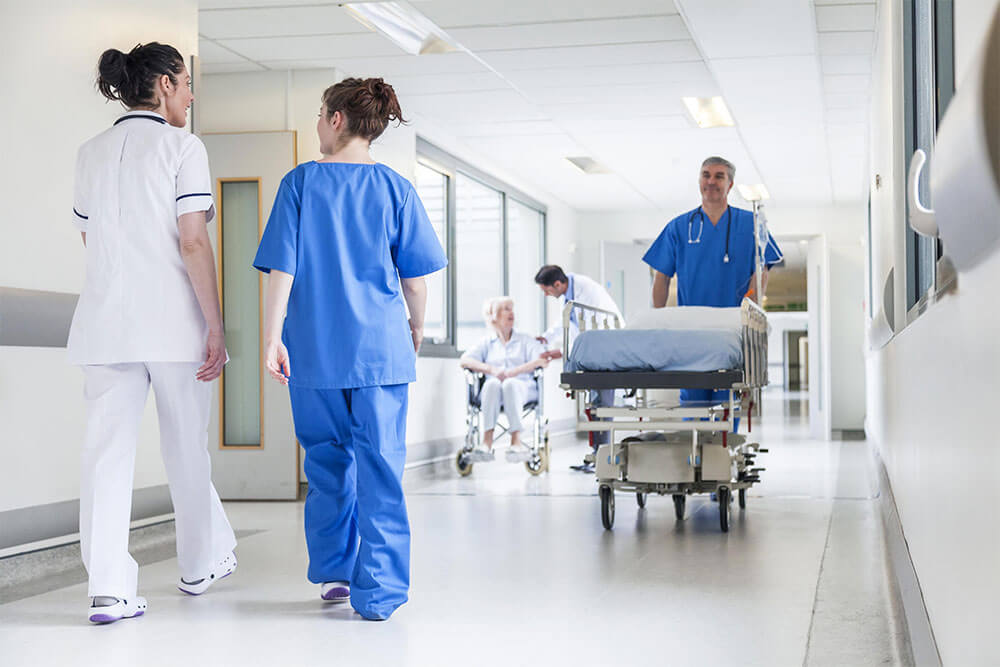- CNA Programs by State
- Alabama
- Alaska
- Arizona
- Arkansas
- California
- Colorado
- Connecticut
- Delaware
- Florida
- Georgia
- Hawaii
- Idaho
- Illinois
- Indiana
- Iowa
- Kansas
- Kentucky
- Louisiana
- Maine
- Maryland
- Massachusetts
- Michigan
- Minnesota
- Mississippi
- Missouri
- Montana
- Nebraska
- Nevada
- New Hampshire
- New Jersey
- New Mexico
- New York
- North Carolina
- North Dakota
- Ohio
- Oklahoma
- Oregon
- Pennsylvania
- Rhode Island
- South Carolina
- South Dakota
- Tennessee
- Texas
- Utah
- Vermont
- Virginia
- Washington
- West Virginia
- Wisconsin
- Wyoming
- Online CNA Programs
- CNA Bridge Programs
- Blog
- CNA Salary Calculator

Table of Contents[show]
CNAs are valuable employees in a broad range of medical facilities including nursing homes, public and private hospitals, rehabilitation centers, and hospice care centers. They are responsible for a large number of tasks with the goals of keeping patients comfortable and maintaining a clean environment. However, five of the most important responsibilities of CNAs today are briefly discussed below.
1. Providing Personal Care to Patients
As a certified nurse aide, you will be required to provide a variety of personal care to patients on a daily basis. Depending on the needs of each individual patient, this may include assisting in feeding, bathing, dressing, combing hair and shaving the patient. Many patients, especially those who are elderly or who have terminal illnesses, have a difficult time performing such tasks on their own.
2. Cleaning Rooms and Changing Linen
As part of your daily schedule as a CNA, you will also need to spend a large portion of your day cleaning rooms and changing linen. This may include emptying bedpans or urinals, mopping floors and cleaning bathrooms as well. Of course, many of the tasks in this section may vary on a day to day basis as necessary. For example, incontinent patients may need bedding changed more frequently than other patients.
3. Taking and Recording Vital Signs
Accurately recorded vital signs help to keep physicians abreast of any positive or negative changes in a patient's condition. As such, you will need to take and record the vital signs of your patients each day. Typically, this will include checking each patient's weight, temperature, pulse and blood pressure. You will be given a schedule as to when you should perform these tasks, and it is highly important for you to follow your daily schedule.
4. Reporting Changes in Patients' Conditions
Changes in a patient's physical condition or behavior can be early signs of a variety of health or emotional issues. With that said, while you are spending time caring for your patients, it is important to take note of any abnormal behavioral or physical changes. While there are many things you should look for, some common changes to take note of include depressive behavior, loss of memory, fatigue, and unexplained lumps, sores or bruises.
5. Organizing Activities for Patients
Finally, many patients in long-term care facilities experience a broad range of emotions such as fear, anxiety, loneliness, anger and depression. To help make patients more comfortable in their environment, it is often the responsibility of CNAs to organize extracurricular activities for them. There are many activities you may wish to partake in with patients, and you will find some of them listed below.
- Reading Books
- Playing Games
- Putting Together Puzzles
- Knitting, Drawing or Other Crafts
- Going for Walks
- Watching Movies
Conclusion
Some of the most important responsibilities of CNAs include providing personal care, recording vital signs and reporting changes in patients' conditions.






